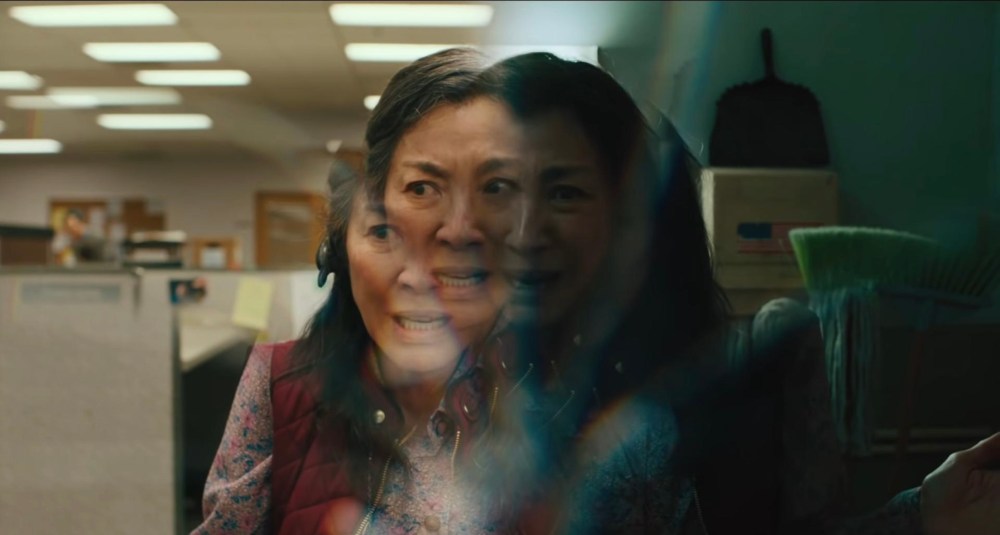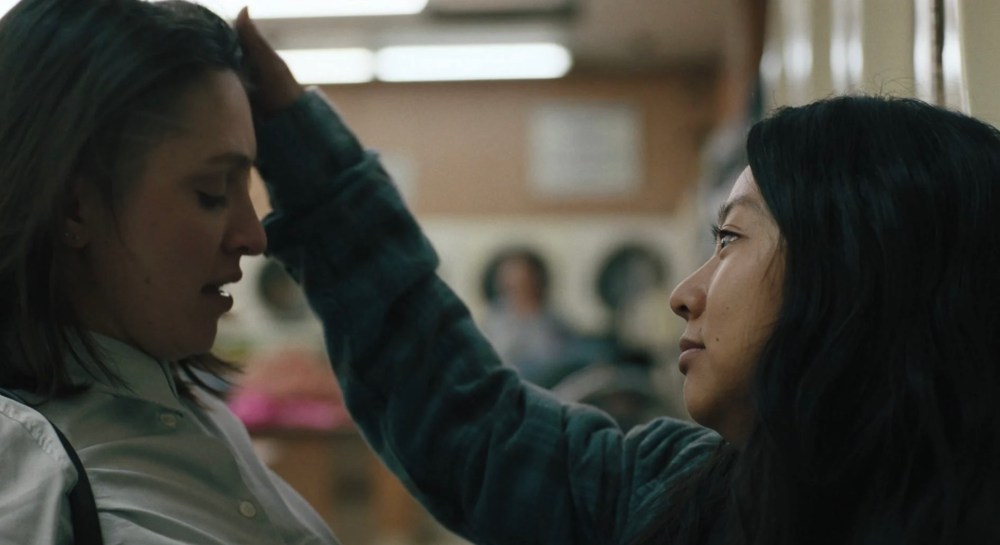*****MULTIVERSAL SPOILERS!!*****
It took me a while to finally see “Everything Everywhere All at Once” (2022), an epic sci-fi/drama/comedy/adventure movie written and directed by Dan Kwan and Daniel Scheinert, and coproduced by the Russo Brothers (Anthony & Joseph), the duo behind “Captain America: Civil War” (one of my favorite Marvel movies). From trailers, all I knew was that the movie featured Michelle Yeoh as a harried, middle-aged, working class Chinese-American woman who experiences parallel universes—an about face from the glamorous, super-athletic sorts Yeoh has played in movies such as 1997’s “Tomorrow Never Dies” and 2000’s “Crouching Tiger, Hidden Dragon.” Turns out, it was well worth the wait.

“Everything Everywhere All at Once” is an explosion of furious imagination and humor surrounding the unlikely heroine of Evelyn Wang (Yeoh), an overtaxed laundromat owner who is apparently living her worst possible life in a multiverse of possibilities. During a tense IRS audit, a stressed-out, distracted Evelyn is pulled from her tortuous everyday existence by a man who appears to be a sharper version of her meek, mild-mannered husband Waymond (Ke Huy Kwan). This Waymond hurls Evelyn into outrageous new realities and bizarre changes of fortune.

In a different reality, Evelyn is in love with her mortal enemy…. oh, and they have hotdogs for fingers, of course.
Evelyn then learns that her daughter, Joy (Stephanie Hsu), has become a dangerous, multiverse-threatening supervillain of near-infinite power after spreading her consciousness across the entirety of creation itself. It’s how Evelyn and her family deal with their dangerous progeny that informs and defines this adventure…
Core Characters
Despite the movie’s dizzying and deliberately chaotic jumps between universes (sometimes depicted by changing aspect ratios), the core story is a family drama about a mother struggling to connect with her increasingly alienated daughter, whom she’s unwittingly driving away, as she struggles to manage her own chaotic life.

Evelyn stands between a her family and a universe where their beloved Gong Gong is a powerful operative.
Other characters who seemingly exist only for comic relief also play important roles in the story, offering glimpses into a wildly unpredictable multiverse where every possible scenario—no matter how absurd—exists.
Evelyn Wang (Michelle Yeoh)
Upon experiencing the totality of her life, including her birth, Evelyn hears the obstetrician announcing to her father, “I’m sorry. It’s a girl.” This speaks to her harsh upbringing, as well as her own unresolved pain.

Evelyn (Michelle Yeoh) in her native universe; a stressed-out mother overwhelmed by a tax audit and a Chinese New Year’s party.
As the movie begins, we see a middle-aged Evelyn as co-owner of a laundromat, living just above the business in an overcrowded apartment, struggling to keep up with bills and expenses. In her present, Evelyn’s faced with the pressures of a tax audit, as well as a Chinese New Year’s celebration she and her husband Waymond are throwing for their community as a means of driving up business. Long gone are Evelyn’s childhood dreams of singing, acting, or pursuing one of her many other passions. Adding to her stress is the increasing alienation from her daughter Joy, whose involvement with a non-Asian girl forces Evelyn to explain their relationship to her conservative father, Gung-Gung (Chinese for maternal grandfather) who’s also living in her care. Evelyn exists in a suffocating space with no separation between work and personal life. It’s a far cry from what she imagined for herself as a young woman, when she ran off with Waymond for an ‘adventurous’ life together…

As Evelyn rides in an IRS elevator with her husband and father, Waymond instantly transforms into a bold, action hero who recruits Evelyn to stop a supervillain named Jobu Tupaki from undoing all of creation. Soon, a confused Evelyn and this turbocharged version of her husband are off on a dazzling, almost incoherent series of misadventures, as they are flung into various versions of Evelyn’s life. This newfound chaos forces Evelyn to rise to the occasion, as she learns to tap into the many different abilities from her various selves across the multiverse, including martial arts, science, and other useful skills. Soon, Evelyn realizes that the dangerous Jobu Tupaki is an all-powerful version of her daughter, Joy, whom her scientist-self pressured into researching infinity. This obsession caused Joy to gain untold powers, while feeding a newfound nihilism which arose from her profound discovery that “nothing matters.” To make things right with the multiverse, Evelyn must somehow make things right with her own daughter.

Note: Michelle Yeoh would be my immediate pick for a Best Actress Oscar at this year’s Academy Awards. I’ve been a fan of hers for decades, and while I’ve had a few issues with “Star Trek: Discovery”, her performance as Philippa Georgiou was never one of them. The reality-hopping Evelyn Wang is a character possessed of many traits, and Yeoh believably conveys each of them. Yeoh can play frumpy and life-beaten in one moment, before shifting to glamorous and regal in the next (flashes of Evelyn’s ‘famous actress’ persona appear to be footage culled from red carpet events in Yeoh’s own career, in fact). None of it ever rings false. This is a career-best performance.
Joy Wang/Jobu Tupaki (Stephanie Hsu)
Much like Dr. Frankenstein’s misunderstood monster, the ‘big bad’ of the movie is Evelyn’s own daughter, who is pushed (in one reality) to better understand the totality of everything. Attaining this insight wreaks havoc, as Joy gleans instantaneous abilities from her many selves across the multiverse, resulting in her own omnipotence. In creating a bagel with (literally) everything on it, Joy/Jobu has also created a paradox that can destroy the multiverse itself.

An alternate Joy Wang/Jobu Tupaki (Stephanie Hsu) is corrupted by her alternate-mother pushing her abilities to their limit.
Mother Evelyn soon realizes that Joy/Jobu’s conflicts arose from their estrangement, which has roots even in the mundane universe, as Evelyn tried to conceal the nature of Joy’s lesbian relationship with girlfriend Becky from Joy’s socially conservative grandfather. This schism and sense of not-belonging helped to fuel Joy/Jobu’s profound realization that the multiverse is utterly indifferent to our sorrows and anguish. What Joy/Jobu and Evelyn come to realize over the course of their journeys across spacetime together is that we give our respective realities meaning. Our very existence is reason and meaning enough.

Note: Stephanie Hsu, like all the main characters in the movie, delights in playing multiple versions of herself, from the frustrated suburban daughter to the vampy, empress god-being of another reality. Hsu was been in Marvel’s “Shang Chi and the Legend of the Ten Rings,” as well as Netflix’s “The Marvelous Mrs. Maisel.” She also has accrued some voice-acting credits as well. The character of Joy/Jobu has ‘breakout role’ written all over it.
Waymond Wang (Ke Huy Kwan)
Waymond Wang is the sweet-natured, kindly husband of Evelyn, whose love drove her away from her family as a young woman and into a deeply ordinary life of cleaning clothes and worrying about taxes. As the film opens, we see this quietly desperate man is contemplating divorce, since he feels responsible for his wife’s stress and misery.

Waymond Wang (Ke Huy Kwan) wields a wicked fanny pack…
Waymond is also the catalyst for a great adventure, when a quick-thinking, multitalented version of himself possesses the laundromat owner version (a la “Ratatouille” or rather “Raccacoonie”), and forces Evelyn into a universe-skipping adventure to save infinity from Joy/Jobu. As with Evelyn and Joy, we see many versions of Waymond as well, and in each, he’s smitten with Evelyn. In one universe where the two of them didn’t marry, but became glamorous celebrities, he still pines for the one that got away—preferring a dull life of cleaning clothes and paying taxes just to be with her. It’s the kindly, laundromat-owning Waymond who holds the key to stopping Joy/Jobu’s onslaught—not through destruction or force, but through his natural kindness and acceptance. His sweet, forgiving nature serves as the steady, gentle breeze in Evelyn (and Joy/Jobu’s) sails.

Waymond’s gentle and forgiving nature is key to saving the fractured multiverse.
Note: I’m mildly embarrassed to admit that I am one of a few Gen Xers who isn’t a huge fan of 1984‘s “Indiana Jones and the Temple of Doom” (my least favorite Indy movie) or 1985’s “Goonies,” so I can’t say I am a lifelong fan of Ke Huy Kwan’s work (though his character of “Short Round” in “Temple” was a highlight in that otherwise so-so movie). All the same, his multiple roles in his film are nothing short of Oscar-worthy. After a long hiatus in the 2000s, it looks like Kwan’s career is on a dramatic upswing, and it’s fitting. Kwan effortlessly shifts his voice from the squeaky primary Waymond to the bolder, more decisive “Alpha Waymond,” the one who effortlessly takes out a squad of armed security guards and police with a single fanny pack.
Gung-Gung (James Hong)
Gung-Gung is expertly played by longtime character actor James Wong (“Blade Runner,” “Big Trouble in Little China,” “Wayne’s World 2”). While the doddering, elderly Gung-Gung is used primarily for comic relief, he too, is another character with many other selves spread across the multiverse.

Decades earlier, this traditional Chinese father nearly disowning his rebellious daughter for running off with Waymond, who’s brought her a life of seeming misery. Across the various universes, we see Gung-Gung oscillate from a doddering, half-senile old coot to a ruthless, deadly operative who’s perfectly willing to shoot his own granddaughter rather than risk her undoing the multiverse. It’s because of Gung-Gung’s traditional and disapproving mindset that Evelyn feels compelled to introduce his granddaughter Joy’s lover as “her good friend,” to not risk upsetting the critical patriarch. However, like Waymond, Gung-Gung still holds a few surprises in his own nature, as well…

Note: I am a great fan of actor James Hong (“Blade Runner,” “Big Trouble in Little China,” “Airplane!” the 2008 remake of “The Day the Earth Stood Still”), and I had the pleasure of meeting him at San Diego Comic Con, about 10 years ago. A tall, lanky man, Hong came to his autographing session wearing a hat shaped like a bowl of noodles, gently poking fun at Chinese-American stereotypes (I am not making that up). I remember looking at the various photos on his autograph table, and trying to decide which one (out of so many memorable roles) I wanted him to sign. I chose one from “Blade Runner,” where he played the genetic designer “Chew.” He signed the photo, “I design your eyes!” He also posed for a photo with my wife and I, but for some reason, I’ve had a hell of a time locating that photo since my old computer crashed.
Diedre Beaubierde (Jamie Lee Curtis)
Veteran actress Jamie Lee Curtis (“Halloween,” “True Lies,” “A Fish Called Wanda”) provides an almost unrecognizably comic turn as tenacious, unyielding, bitterly lonely IRS tax auditor, Diedre Beaubierde.

Jamie Lee Curtis is cast wildly and effectively against type as Diedre, the Wang family’s mortal foe at the IRS.
As with the other characters, we see various versions of Diedre across the multiverse as well; from an unstoppable, terminator-like operative of the omniscient Jobu to the hotdog-fingered lover of a very different Evelyn (in a universe where human fingers are made virtually useless by a quirk of natural selection). In the working-class Evelyn’s reality, the two women are arch-nemeses, as the bitter Diedre seems hellbent on making the Wang family’s lives as miserable as her own. At a Chinese New Year’s party thrown by the Wang’s laundromat in the story’s climax, a deeply frustrated Evelyn loses it—smashing a window in pure frustration. This display earns Evelyn the dubious respect of Diedre. We then see the seeds of a possible friendship, as the two share hits on a bong together. Suddenly, their love in the hotdog-fingered universe isn’t so hard to imagine. Sometimes repulsion and attraction are two sides of the same coin.

Note: The talented Jamie Lee Curtis sheds all vanity for this project; embracing a pot belly, an unflattering haircut, thrift shop clothing, and a fixed, dour expression that adds a solid decade to her age. It’s a long way from her early days as a ‘scream queen’ (“Halloween,” “Prom Night”) and sex symbol (“Trading Places” “True Lies”), while smartly showcasing Curtis’s comedy chops. She is another of the movie’s unconventional casting approaches that really pays off.
Becky Sregor (Tallie Medel)
While the role of Joy’s girlfriend Becky is a small part, she represents an important part of Joy’s life that she’s unable to share with her family. This is a factor in Joy’s estrangement, as she tearfully begs Evelyn to let her go with the woman she loves. This is a painful parallel with the ‘mistake’ Evelyn herself made when she ran off with Waymond decades earlier—a mistake that Evelyn now realizes was a force for good in her own life (or lives). Becky is an admittedly underused, but important symbolic character.

Note: The nonbinary Tallie Medel is memorable in their role, despite their limited screen time. They’ve many roles in various projects, including several writing credits. Now that I own the BluRay of the movie, I’m curious to see if the character of Becky has other moments in the deleted scenes.
Summing “Everything” Up
Beneath the movie’s mind-bending premise lies a simple story of a mother and daughter fighting estrangement. The imaginatively-executed realities, like the ghosts of Dickens’s “A Christmas Carol,” are a means of showing Evelyn and Joy why they matter to each other, even if all of creation is meaningless. It takes Evelyn’s mild-mannered husband Waymond to demonstrate, by example, a better way forward. Despite its dizzying reality-jumps, “Everything Everywhere All at Once” is, at its core, the tale of a family’s reconciliation—just as Star Wars was an Arthurian bedtime story wrapped in space-age trappings.

Alternating from working class frumpiness to the apex of Hollywood glamour, Michelle Yeoh is thoroughly believable in each incarnation of her character’s many selves. She is ably supported by Ke Huy Kwan (who stole the otherwise dismal “Indiana Jones and the Temple of Doom” as Short Round), as well as Stephanie Hsu. It’s also nice to see a major sci-fi/fantasy movie fronted by an Asian-American cast and steeped in Asian-American culture—a perspective that is both rare and refreshing.

The sheer imagination invested in the various realities is both staggering and hilarious. It gives greater scope to the infinite possibilities within this theoretical multiverse, as we see the usual wish-fulfillments (movie star, opera singer, scientist, etc) as well as the truly bizarre (hotdog-fingered people, animated children’s etchings, living piñatas and mobile, sentient rocks). There are slyly-embedded references to “The Matrix,” superhero movies, Bollywood films, and even “2001: A Space Odyssey.” There’s also an attractive “Secret Life of Walter Mitty” aspect to the story as well. Be prepared for a few off-color sight gags, too…the movie certainly earns its R rating.

In yet another universe where life never formed, mother/daughter exist as expressive rocks.
I could imagine the family reconciliation story within this film being told without the sci-fi premise, and it might still work, but it’s that blending of outrageously absurd fantasies with mundane reality that gives the movie its unique voice. The multiverse also affords nice opportunities for its talented cast to give their all, as each of them tackles multiple roles.
The freshness and imagination densely packed into the 139-minute running time of “Everything Everywhere All at Once” is as explosive as the potential within each of its characters—or in any of us, for that matter.
Where to Watch
Rather than pay $20 for a digital copy (via iTunes, Vudu, YouTube premium, AmazonPrime, or any number of online vendors), I broke down and bought the BluRay (which includes a digital copy) at a local brick and mortar retailer for $15—the price I would’ve paid for one ticket to see it theatrically these days. I watched it on a 7 ft/2 meter collapsible screen at home in total darkness; it was as theatrical as I needed. Normally, I’m a bit nervous about buying new movies sight unseen, but this was a gamble that paid off. The movie is also available for streaming via Hulu and Peacock, but only if you pay a little extra to bundle the service with Showtime, which I didn’t want at this time. It’s easier to just buy it on physical media.


With all the popularity that the multiverse has earned in both reality and science fiction, including my own complicated Mandela Effected history, it’s great to know that such movies like this one can make the most artistic use of the subject. I may want to see it and I’m also a Michelle Yeoh fan. We have come so far, other worlds, other galaxies, other universes in our explorations in both fact and fiction. As well as the realms of inner space. Where we could go possibly go after the multiverse is bound to overwhelmingly challenge our imaginations.
Once again, another deeply thoughtful comment! Thanks again, Mike!
PS: I think you’d enjoy it very much.
You’re very welcome.
I finally saw it yesterday. Quite a mind job of a movie. After seeing I’m Thinking Of Ending Things, I was somewhat prepared for how daring such movies could become for the 2020s. Certainly for how such movies can earn the best in Oscar recognition.
Congratulations to all the Oscar winners for this film. Especially Michelle.